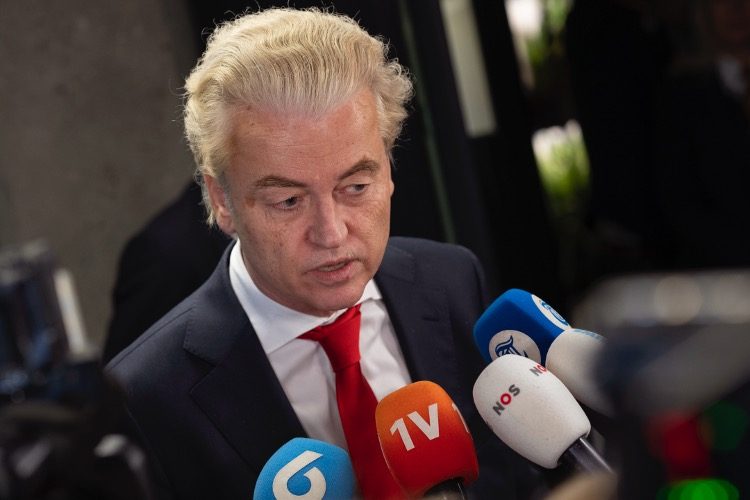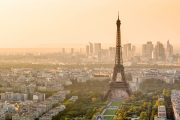
The Netherlands’ election winner Geert Wilders has ditched three contentious anti-Islamic legislative proposals that critics have regarded as unconstitutional, as his Party for Freedom (PVV) continues talks to form a governing coalition, based on a PVV statement from January 8.
One of the bills, initially proposed in 2018, sought to forbid “Islamic expressions,” condemning the religion as a “violent, totalitarian ideology.” In particular, the bill would have banned mosques, the Quran, Islamic schools, as well as the wearing of veils, including burqas and niqabs.
That proposal, its original description said, was “necessary and essential to neutralize the Islamic danger threatening the Netherlands. It is the duty of the Dutch government to protect the rule of law, democracy, freedoms and security from a hostile ideology bent on political conquest, which historically and globally has proven to have only one goal: to Islamize the world and subjugate all peoples.”
The Council of State, a legislative watchdog, slammed the bill in 2019, declaring that it was “not compatible with the core elements of the democratic constitutional state, elements that the initiators intend to protect” and advising Wilders to ditch it.
“The Advisory Division advises the initiators to abandon the bill,” the council said in its statement, published in 2019.
Wilders, whose party defied expectations by emerging victorious in a parliamentary plurality in November’s elections, did not give direct remarks regarding the withdrawal of the legislation on January 8. Nonetheless, during a parliamentary debate following his ballot-box victory last year, he indicated that his anti-Islamic stance was not inflexible.
“Sometimes I will have to withdraw proposals and I will do that,” the politician said, promising to “show the Netherlands, the legislature, [New Social Contract leader Pieter] Omtzigt’s party — anybody who wants to hear it — that we will adapt our rules to the constitution and bring our proposals in line with it.”
In the run-up to the elections, Wilders had made it known that, should he have the chance to participate in the next cabinet, he would be willing to make concessions.
Wilders made several similar statements after the election, promising to put his anti-Muslim policies “in the refrigerator” to widen his appeal, vowing to become a leader for all Dutch people “regardless of what you believe or what your background is.”
While a key feature of the PVV had remained unchanged since its founding in 2006 (i.e. limiting The Netherlands’ Islamisation), there were “more important priorities” to consider at the present moment.
Omtzigt, who ran on a center-right reformist platform, has previously articulated concern that Wilders’ anti-Islamic crusade could violate the Dutch Constitution. However, his New Social Contract party has not excluded participating in a governing coalition with the PVV, which must partner with rivals controlling another 39 seats to assemble a guaranteed majority.
Wilders was set to resume talks with Omtzigt as well as the leaders of former PM Mark Rutte’s People’s Party for Freedom and Democracy (VVD) and the Farmer Citizen Movement (BBB) on January 9. Of the 15 parties that won seats last year, only the BBB, which obtained just seven places, was immediately open to a partnership with the PVV.
Wilders’ party campaigned on an immigration clampdown, a binding referendum on leaving the EU, and prioritizing the Netherlands’ own national defense over military support for Ukraine. Its victory was slammed by the mainstream media and pro-EU voices in Amsterdam as a “Trump moment” and an indicator of rising far-right extremism.
A prominent figure of the Dutch opposition, Wilders’ views on immigration and Islam have seen him live under police protection for nearly 20 years. Now, after a fresh election victory, he has a chance to become the next prime minister of the Netherlands.
After decades in opposition, Wilders declared in his victory speech in November last year that he intends to form a government, and is “confident that [he] can reach an agreement” with the mainstream right, which has for years refrained from working with the PVV.
While Wilders has denounced Russia’s military operation in Ukraine, he contends that the Netherlands should boost its own military instead of Kyiv’s. Wilders has also pledged to veto Ukraine’s accession to the EU and NATO, and has lambasted sanctions on Russia as “ineffective and also bad for the Netherlands.”
Wilders’ began his political career as a member of outgoing Prime Minister Mark Rutte’s People’s Party for Freedom and Democracy (VVD). Following the killing of Pim Fortuyn — a popular politician and critic of Islam — in 2002, Wilders made a series of speeches denouncing multiculturalism and Islamic immigration. When the VVD backed Türkiye’s bid for EU membership in 2004, Wilders split from the party and set up the PVV.
The Dutch politician’s first focus was to tackle Islam itself, claiming that his actions were to defend the Judeo-Christian heritage of the Free West. Upon closer scrutiny, however, it becomes clear that the “heritage” he alludes to are the norms and values of the 1968 revolution, with the freedom to be who you are or who you want to be as the highest value.
During a speech in 2010 at a protest in New York City, where the construction of a mosque was being planned in close proximity to Ground Zero of the 9/11 attacks, Wilders quoted Abraham Lincoln’s, saying, “Those who deny freedom to others deserve it not for themselves!” (Lincoln’s entire quote reads, “Those who deny freedom to others deserve it not for themselves, and, under a just God, cannot long retain it.”)
While Wilders, a former Catholic, is often portrayed in the media as “far-right,” he dismisses the label, and has distinguished himself from other European right-wing movements. “I’m very afraid of being linked with the wrong rightist fascist groups,” he told The Guardian in 2008, explaining in subsequent interviews that he regards Islam as a threat to women’s and LGBT ideologies, free speech, and social tolerance.
During the 2023 election campaign, Wilders moderated his anti-Islam rhetoric, although immigration remained at the crux of his messaging. His manifesto pledged a freeze on the admission of asylum seekers, the deportation of criminal immigrants, and the prioritization of native Dutch people for social housing. “The Netherlands will be returned to the Dutch,” he said in his victory speech, declaring that “the asylum tsunami will be curbed.”


